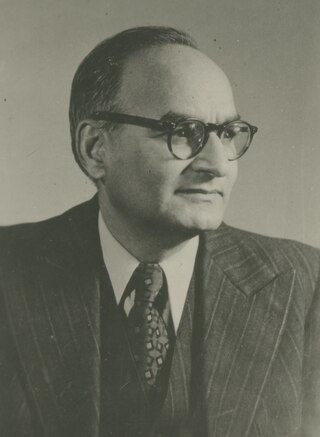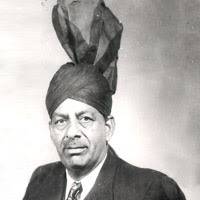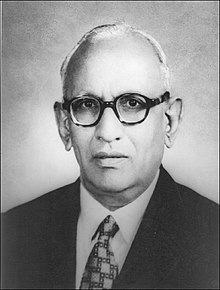Gujarati: [ibɾahimisma'iltʃundɾigəɾ] ; 15 September 1897 – 26 September 1960) was a Pakistani politician who served as the sixth prime minister of Pakistan, appointed in this capacity on 17 October 1957. He resigned due to a vote of no confidence on 11 December 1957, against him. [1]
Contents
- Biography
- Early life and law practice
- Legislative career in India and Pakistan Movement
- Public service in Pakistan
- Diplomacy and governorships
- Law ministry in coalition administration
- Prime Minister of Pakistan (1957)
- Third shortest tenure
- Death and reputation
- Notes
- References
- External links
He was trained in constitutional law at the University of Bombay and was one of the Founding Fathers of the Dominion of Pakistan. Having served for just 55 days, Chundrigar's tenure is the third shortest served in the parliamentary history of Pakistan, after those of Shujaat Hussain and Nurul Amin, who served as prime minister for 54 and 13 days, respectively. [3] [4]
Biography
Early life and law practice
Ibrahim Ismail Chundrigar, a Muhajir, was born in Godhra, Gujarat, in India on 15 September 1897. [1] [5] [ disputed – discuss ] He was an only child. [6]
Chundrigar was initially schooled in Ahmedabad where he finished his matriculation and moved to Bombay for his higher studies. He attended the University of Bombay where he earned a BA degree in philosophy, and later the LLB degree in 1929. [7] [8] [9] From 1929 till 1932, Chundrigar served as a lawyer for the Ahmedabad Municipal Corporation. [10]
From 1932 until 1937, Chundrigar practiced civil law, and moved to practice and read law at the Bombay High Court in 1937, where he established his reputation. [9] During this time, he became acquainted with Muhammad Ali Jinnah, sharing similar ideology and political views. [6]
In 1935, Chundrigar was chosen by the Muslim League to give a response to the Government of India Act 1935 introduced by the British government in India. Notably, concerning the role of the Governor-General as head of state, Chundrigar denied that the Governor-General enjoyed the powers supposedly granted by the Act. [11]
From 1937 till 1946, Chundrigar practiced and read law, taking several cases on civil matters where he advocated for his clients at the Bombay High Court. [12]
Legislative career in India and Pakistan Movement
Chundrigar stood for the Bombay Legislative Assembly as a Muslim League candidate in the 1937 provincial elections, and was elected from the Ahmedabad district rural constituency. From 1940 to 1945, he was president of the Bombay provincial Muslim League. [1] [13]
In 1946, he was elected to the assembly from a Muslim urban constituency in Ahmedabad. [14] He was appointed as Commerce Minister under the presidential administrations of the Viceroys of India, Archibald Wavell (1946) and Louis Mountbatten (1946-47). [8] Peter Lyon, a reader emeritus in international relations, described Chundrigar as a "close supporter" of Mohammad Ali Jinnah in the Pakistan Movement. [15]
Public service in Pakistan
Diplomacy and governorships
After the partition of India by the act of the British Empire that established Pakistan, Chundrigar endorsed Liaquat Ali Khan's bid for the premiership [ citation needed ] and was retained as the commerce minister in the administration of Prime Minister Liaquat Ali Khan on 15 August 1947. [16]
In May 1948, Chundrigar left the Commerce Ministry and was appointed as Pakistan's Ambassador to Afghanistan. [17] [18] Although his appointment was favorably received in Afghanistan, Chundrigar was at odds with the Afghan government (supported by India as early as 1949) over the issue of Pakistan's north-west border with Afghanistan. [19]
Chundrigar's tenure as ambassador was short. He was recalled to Pakistan by the Foreign Office, which viewed his inability to understand the Pashtun culture as a possible factor in fracturing Afghan-Pakistan relations. [20] In 1950, Chundrigar was appointed governor of Khyber-Pakhtunkhwa, a position he held until 1951. [8] A Cabinet reshuffle in 1951 allowed him to be appointed as the governor of Punjab but he resigned in 1953 due to differences with Governor-General M.G. Muhammad when he enforced martial law at the request of Prime Minister K. Nazimuddin to control violent religious riots that occurred in Lahore, Pakistan. [3]
Law ministry in coalition administration
In 1955, Chundrigar was invited to join the central government of a three-party coalition: the Awami League, the Muslim League, and the Republican Party. [3] He was appointed as minister of law and justice. [21] During this time, he also acted as a leader of the opposition, opposing the mainstream agenda presented by the Republican Party. [22]
At the National Assembly, he established his reputation as more of a constitutional lawyer than a politician, and gained a lot of prominence in public for his arguments in favour of parliamentarianism when he pleaded the case of "Maulvi Tamizuddin vs. Federation of Pakistan". [8]
Prime Minister of Pakistan (1957)
Third shortest tenure
After the resignation of Prime Minister Suhrawardy in 1957, Chundrigar was nominated as the Prime Minister and was supported by the Awami League, the Krishak Sramik Party, the Nizem-i-Islam Party, and the Republican Party. [23] However, this coalition of mixed parties weakened Chundrigar's authority to run the central government, and divisions within the coalition would soon hamper his efforts to amend the Electoral College. [8] On 18 October 1957, Chundrigar became the Prime Minister of Pakistan, receiving his oath of office from Chief Justice M. Munir. [23]
At the first session of the National Assembly, Chundrigar presented his plan to reform the Electoral College which was met with great parliamentary opposition by even his Cabinet ministers from the Republican Party and the Awami League. [24] [23] With the Republican Party leaders—party president Feroz Khan and President of Pakistan Iskander Mirza —exploiting and manipulating the opponents of the Muslim League, a successful vote of no-confidence in the National Assembly led by the Republicans and the Awami Party effectively ended Chundrigar's term. He resigned on 11 December 1957. [24] [23]
Chundrigar served the third-shortest term of any Prime Minister in Pakistan: 17 October 1957 –11 December 1957, 55 days into his term. [4] [3]
Death and reputation
In 1958, Chundrigar was appointed as president of the Supreme Court Bar Association, a position he held until his death. [2] In 1960, Chundrigar traveled to Hamburg where he addressed the International Law Conference and suffered a hemorrhage while visiting in London. [2] For treatment, he was taken to the Royal Northern Hospital and suddenly died. [2] His body was brought back to Karachi in Pakistan, where he was buried in a local cemetery. [2]
In his honour, the government of Pakistan renamed McLeod Road in Karachi after him. [25]
Notes
Related Research Articles

Abdul Ghaffār Khān, also known as Bacha Khan or Badshah Khan, was an Indian independence activist from the North-West Frontier Province, and founder of the Khudai Khidmatgar resistance movement against British colonial rule in India.

Sahibzada Iskander Ali Mirza, CIE, OBE was a Pakistani politician, statesman and military general who served as the Dominion of Pakistan's fourth and last governor-general of Pakistan from 1955 to 1956, and then as the Islamic Republic of Pakistan's first president from 1956 to 1958.

Liaquat Ali Khan was a Pakistani lawyer, politician and statesman who served as the first prime minister of Pakistan from 1947 until his assassination in 1951. He was as pivotal to the consolidation of Pakistan as the Quaid-i-Azam, Muhammad Ali Jinnah, was central to the creation of Pakistan. He was one of the leading figures of the Pakistan Movement and is revered as Quaid-e-Millat and later on as "Shaheed e Millat".

Sir Khawaja Nazimuddin was a Pakistani politician and statesman who served as the second governor-general of Pakistan from 1948 to 1951, and later as the second prime minister of Pakistan from 1951 to 1953.

The All-India Muslim League (AIML), simply called the Muslim League, was a political party established in Dhaka in 1906 when some well-known Muslim politicians met the Viceroy of India, Lord Minto, with the goal of securing Muslim interests in British India.
Nurul Amin was a Pakistani politician and jurist who served as the eighth prime minister of Pakistan from 7 December to 20 December 1971. His term of only 13 days as prime minister was the shortest served in Pakistani parliamentary history. He was also the only Vice President of Pakistan.

Chaudhry Muhammad Ali was a Pakistani politician and statesman who served as the fourth prime minister of Pakistan from 1955 until his resignation in 1956. His government transitioned Pakistan from a British Dominion to an Islamic Republic.

Huseyn Shaheed Suhrawardy was a Pakistani Bengali barrister and politician. In Bangladesh, Suhrawardy is remembered as a pioneer of Bengali civil rights movements, later turned into Bangladesh independence movement, and the mentor of Bangladesh's founding leader Sheikh Mujibur Rahman. He is also remembered for his performance as the Minister for Civil Supply during the Bengal famine of 1943. In India, he is seen as a controversial figure; directly responsible for the 1946 Calcutta Killings, for which he is often referred as the "Butcher of Bengal" in West Bengal.

The Pakistan Movement emerged in the early 20th century as part of a campaign that advocated the creation of an Islamic state in parts of what was then British India. It was rooted in the two-nation theory, which asserted that Indian Muslims were fundamentally and irreconcilably distinct from Indian Hindus and would therefore require separate self-determination upon the decolonization of India. The idea was largely realized when the All-India Muslim League ratified the Lahore Resolution on 23 March 1940, calling for the Muslim-majority regions of the Indian subcontinent to be "grouped to constitute independent states" that would be "autonomous and sovereign" with the aim of securing Muslim socio-political interests vis-à-vis the Hindu majority. It was in the aftermath of the Lahore Resolution that, under the aegis of Muhammad Ali Jinnah, the cause of "Pakistan" became widely popular among the Muslims of the Indian independence movement.

Sir Malik Feroz Khan Noon, best known as Feroze Khan, was a Pakistani politician who served as the seventh prime minister of Pakistan from 16 December 1957, until being removed when the President Iskandar Ali Mirza imposed martial law, though he himself got ousted in the 1958 Pakistani military coup.

Abul Kasem Fazlul Huq, popularly known as Sher-e-Bangla, was a Bengali lawyer and politician who presented the Lahore Resolution which had the objective of creating an independent Pakistan. He also served as the first and longest Prime Minister of Bengal during the British Raj.

The Lahore Resolution, also called the Pakistan Resolution, was a formal political statement adopted by the All-India Muslim League on the occasion of its three-day general session in Lahore, Punjab, from 22 to 24 March 1940, calling for a separate homeland for the Muslims of British India.

Mian Iftikharuddin was a Pakistani politician, activist of the Indian National Congress, who later joined the All-India Muslim League and worked for the cause of Pakistan under the leadership of Muhammad Ali Jinnah. He was known for his left-wing politics and briefly served as the Provincial Minister for Rehabiilitation of Refugees in Punjab.
Nawab Sir Muzaffar Ali Khan Qizilbash was born in 1908. He was a Pakistani politician from the Punjab and a minister in the governments of the Punjab, West Pakistan and Pakistan. Muzaffar Qizilbash started his legislative career as a Unionist, later joining the Muslim League and subsequently the Republican Party. He later served as Minister for Industries in the cabinet of Prime Minister Ibrahim Ismail Chundrigar from 18 October 1957 – 16 December 1957. Afterwards, he served as Minister for Industries, Commerce and Parliamentary Affairs in the cabinet of Prime Minister Feroz Khan Noon (Republican) from 16 December 1957 – 18 March 1958, when he was appointed Chief Minister of West Pakistan.

Nawab Mohammad Ismail Khan was an eminent Muslim politician and a leading activist of the All-India Muslim League, who stood in the forefront of the Khilafat Movement and Pakistan Movement. Nawab Mohammad Ismail Khan is regarded as one of the founding fathers of the Islamic Republic of Pakistan due to the roles that he fulfilled for the cause of it. His position was described as only second to that of Muhammad Ali Jinnah.
Events from the year 1951 in Pakistan.

Raja Ghazanfar Ali Khan Khokhar was an Indian politician and monarch. He was born in Pind Dadan Khan, a town in Jhelum district, British India. He was a leading member of the All India Muslim League and a trusted lieutenant of Muhammad Ali Jinnah, serving in the Interim Government of India of 1946 as a member of the Central Legislative Assembly of India.

The Muslim League was the original successor of the All-India Muslim League that led the Pakistan Movement to achieve an independent nation. Five of the country's Prime Ministers have been affiliated with this party, namely Liaquat Ali Khan, Khwaja Nazimuddin, Mohammad Ali Bogra, Chaudhry Muhammad Ali, and Ibrahim Ismail Chundrigar. The Muslim League was defeated in the 1955 elections to the Constituent Assembly by a political alliance known as the United Front. However, Prime Minister Chaudhry Mohammad Ali and later Prime Minister Ibrahim Ismail Chundrigar were appointed to lead a minority government. The party was dissolved in 1958 after the declaration of Martial Law by General Muhammad Ayub Khan, the Commander-in-Chief of Pakistan Army.

Abdul Hamid Khan Bhashani, often shortened as Maulana Bhashani, was a Bengali politician. His political tenure spanned the British colonial India, Pakistan and Bangladesh periods. Maulana Bhashani was popularly known by the honorary title Mozlum Jananeta for his lifelong stance advocating for the poor. He gained nationwide mass popularity among the peasants and helped to build the East Pakistan Peasant Association. Owing to his political leaning to the left, often dubbed Islamic Socialism, he was also called 'The Red Maulana'. He is considered as one of the main pillars of Bangladeshi independence (1971).

The Chundrigar government also known as the Chundrigar administration was the seventh government and cabinet of Pakistan formed by Ibrahim Ismail Chundrigar on 18 October 1957 after the resignation of the previous prime minister, Huseyn Shaheed Suhrawardy.
References
- 1 2 3 4 Khan Tahawar Ali Khan, ed. (1961). Biographical Encyclopedia of Pakistan. Biographical Research Institute, Pakistan. p. 106. Retrieved 23 January 2018.
- 1 2 3 4 5 6 7 "Chundrigar dies in London". Dawn. Pakistan. 29 September 1960. Retrieved 25 January 2018.
- 1 2 3 4 Burki, Shahid Javed (2015). "§I.I. Chundrigar". Historical Dictionary of Pakistan. Rowman & Littlefield. p. 136. ISBN 9781442241480 . Retrieved 24 January 2018.
- 1 2 Grover, Verinder; Arora, Ranjana (1995). Political System in Pakistan: Role of military dictatorship in Pakistan politics. Deep & Deep. p. 244. ISBN 9788171007387 . Retrieved 24 January 2018.
- ↑ Goradia, Prafull (2003). Muslim League's unfinished agenda. New Delhi: Contemporary Targett. p. 53. ISBN 81-7525-376-2.
Chundrigar ... hailed from Godhra in Gujarat
- 1 2 "The Chundrigar Diaries" . Sunday Times. Islamabad. 25 November 2012.
The only child of his parents ... in total consonance with Mr. Jinnah's vision
- ↑ Bombay, University of (1929). The Bombay University Calendar. Bombay, India: University of Bombay Press. p. 101. Retrieved 24 January 2018.
- 1 2 3 4 5 "Former Prime Minister of Pakistan: Ibrahim Ismail Chundrigar". storyofpakistan.com. Lahore, Punjab, Pakistan: Nazaria-i-Pakistan Trust. 1 June 2003. Retrieved 24 January 2018.
- 1 2 Saʻīd, Aḥmad; Institute of Pakistan Historical Research (Lahore, Pakistan) (1997). Muslim India, 1857-1947: a biographical dictionary. Institute of Pakistan Historical Research. p. 111. OCLC 246043260.
- ↑ Asia Who's Who. 1957. p. 90. Retrieved 24 January 2018.
- ↑ Newberg, Paula R. (2002). "Constituting the State". Judging the State: Courts and Constitutional Politics in Pakistan. Cambridge, UK: Cambridge University Press. p. 50. ISBN 9780521894401 . Retrieved 24 January 2018.
- ↑ The Asia Who's who. Pan-Asia Newspaper Alliance. 1957. p. 90. Retrieved 24 January 2018.
- ↑ Singh, Nagendra Kumar, ed. (2001). "Chundrigar, Ismail Ibrahim (1897 — 1960)". Encyclopaedia of Muslim biography: India, Pakistan, Bangladesh. Vol. II. New Delhi: A.P.H. Publishing Corporation. p. 196. ISBN 81-7648-232-3.
- ↑ Sho, Kuwajima (1998). Muslims, Nationalism, and the Partition: 1946 Provincial Elections in India. Mumbai: Manohar. p. 172. ISBN 978-81-7304-211-9 . Retrieved 29 January 2018.
- ↑ Lyon, Peter (2008). Conflict Between India and Pakistan: An Encyclopedia. ABC-CLIO. p. 42. ISBN 978-1-57607-712-2.
- ↑ Lentz, Harris M. (2013) [First published 1994]. Heads of States and Governments. Routledge. p. 612. ISBN 978-1-134264-90-2 . Retrieved 24 January 2018.
- ↑ Pāshā, Aḥmad Shujāʻ (1991). Pakistan: a political profile, 1947 to 1988. Sang-e-Meel Publications. p. 88. Retrieved 24 January 2018.
- ↑ Dani, Ahmad Hasan (1979). World Scholars on Quaid-i-Azam Muhammad Ali Jinnah. Quaid-i-Azam University Press. p. 342.
- ↑ Yunas, S. Fida (2002). Afghanistan: The Peshawar Sardars' branch of Barakzais. pp. 220–221. Retrieved 24 January 2018.
- ↑ "Foreign Affairs Pakistan". Foreign Affairs Pakistan. 35 (7–9). Pakistan, Ministry of Foreign Affairs: 487. July 2008. Retrieved 24 January 2018.
- ↑ Constituent Assembly (Legislature) of Pakistan Debates: Official Report. Manager of Publications. 1956. p. 19. Retrieved 25 January 2018.
- ↑ Akbar, M. K. (1997). Pakistan from Jinnah to Sharif. Mittal Publications. p. 149. ISBN 9788170996743 . Retrieved 25 January 2018.
- 1 2 3 4 "I. I. Chundrigar Becomes Prime Minister". storyofpakistan.com. Lahore, Punjab, Pakistan: Nazaria-i-Pakistan Trust. 1 June 2003. Retrieved 25 January 2018.
- 1 2 Zakaria, Nasim (1958). Parliamentary Government in Pakistan. New Publishers. p. 62. Retrieved 25 January 2018.
- ↑ "I. I. Chundrigar Road — Developing Attraction at the Financial Hub". Pakistan & Gulf Economist. Vol. 26. 2007. p. 19. ISSN 0030-9745.
External links
Ibrahim Ismail Chundrigar | |
|---|---|
ابراہیم اسماعیل چندریگر | |
 | |
| 6th Prime Minister of Pakistan | |
| In office 17 October 1957 –11 December 1957 |



